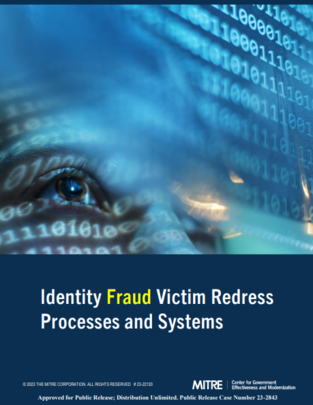Opportunities Exist for the Federal Government to Better Support Victims of Identity Fraud
It can be difficult for people to resolve issues after their identity is stolen. Victims report feeling burdened by the federal government’s decentralized redress process. We commissioned a report that proposes a whole-of-government, victim-centered approach to comprehensively supporting individuals throughout the process. Read the report.
In our June 2022 identity fraud insights report we highlighted that the government has a decentralized approach to supporting victims of identity fraud, which requires the victim to resolve the fraud and its consequences on their own. To bring greater attention to identity fraud victims and their experiences, we commissioned the MITRE Corporation (MITRE)* to conduct an independent study and define the elements needed for a whole-of-government approach to identity fraud redress. Having listened to the experiences of victims of identity fraud, government officials, and advocacy groups, MITRE developed a report that reimagines the government’s approach to supporting identity fraud victims, placing them at the center of the process.
The report also highlights that identity fraud victims often feel they are not treated like victims of a crime. While victims of other crimes are often provided support mechanisms, identity fraud victims are left to pick up the pieces themselves. Victims are required to clean up their credit scores, address tax consequences, and prove eligibility for rightful benefits.
What The Study Found
Through interviews with victims of identity theft, the report describes the current identity fraud redress process as “burdensome, messy, confusing, isolating, and frustrating.” At the same time, government officials expressed the need for standardized policies, dedicated funding, and proper data sharing capabilities to support identity fraud victims.
With this in mind, the report proposes a federal redress process that places the identity fraud victim at the center and requires agencies to assist in a comprehensive manner. Framed as a single enterprise, or a “one-stop shop,” this process would provide an equitable experience for all victims to submit claims and follow them to completion. This one-stop shop also allows government agencies to share data and communicate with one another to complete the redress process for the victims.
Why We Are Sharing This Report
Identity theft surged greatly during the pandemic as a result of the unprecedented amount of money that went to programs meant to benefit individuals. Identity fraud has serious ramifications for victims and their families because fraudsters steal benefits they aren’t entitled to. Supporting identity theft victims by placing them squarely in the center of a reimagined redress process better protects consumers and can help reduce the impact of fraud on American taxpayer dollars.
Learn more about the PRAC's and our oversight partners’ efforts to improve the government’s response to identity fraud: Identity Theft in Pandemic Benefits Programs.
*MITRE is a not-for-profit, federally funded research and development center.


